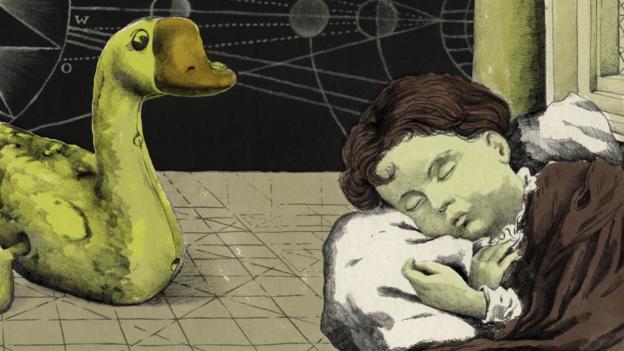I’m standing outdoors my childhood important college, shut to the entrance gates and the academics’ automobile park. It’s miles a intellectual sunny day and I’m surrounded by my classmates. There must always be better than a hundred of us.
I own a shadowy feeling that a pair of of my teachers are shut by, but my attention is on two adults, neither of which I recognise. The man I test in lurid detail – from the slick shine of his hair to the golden lenses on his shades. He holds up some more or much less instrument that emits a piercing divulge. I drop to my knees with my palms against my ears. My schoolmates are all doing the identical. The man is laughing maniacally.
I had that dream nearly 40 years in the past, but I’d additionally take into accout the important points as if it were the old day. Demand me to relate the relaxation from a dream I had earlier this week, on the opposite hand, and I scheme a blank. If I were dreaming – and biology would counsel I most doubtlessly own – nothing has lingered prolonged ample to stay in my waking ideas.
It’s most likely you’ll presumably well presumably additionally luxuriate in:
- Study the way to develop into a lucid dreamer
- The pretty truth about why we sleep
- A dream-traveller’s handbook to the napping ideas
For lots of folks, needs are an nearly intangible presence. If we’re fortunate, we can handiest take into accout essentially the most fleeting search for in the frigid light of day; even these of us who can recollect past needs in wonderful detail can wake some days with nearly no memory of what we had dreamed about.
There is diminutive ethereal regarding the causes this could presumably well be going on, on the opposite hand. Why we now own needs – and whether or no longer we’d additionally take into accout them – are each rooted in the biology of our napping our bodies and subconscious ideas.
Sleep is more complicated than we as soon as thought. In favor to being a plateau of unconsciousness bookended by slipping interior and outdoors of sleep, our resting brains battle through a rollercoaster of mental states, with some parts being beefy of mental activity.
Dreaming is most closely associated with the sleep divulge identified as Like a flash Witness Circulation (REM). REM is each now and then identified as desychronised sleep, because it must always imitate a pair of of the indicators of being wide awake. In REM sleep, the eyes twitch with out notice, there are adjustments in respiratory and circulation, and the physique enters a paralysed divulge identified as atonia. It occurs in 90-minute-waves trusty through sleep, and it’s at this stage that our brains tend to dream.
There is an further float of blood to mandatory parts of our mind trusty through the REM divulge: the cortex, which fills our needs with their assert, and the limbic machine, which processes our emotional divulge. Whereas we’re in this dream-pleasant divulge of sleep, they fire with inflamed electrical activity. The frontal lobes, on the opposite hand – which enlighten our vital colleges – are restful.
This implies we steadily blindly fetch what goes on in this steadily nonsensical narrative until the time involves procure up.
It’s doubtlessly a stunning ingredient that the dream existence and the waking existence are fully varied – Francesca Siclari
The scenario is, the more jumbled the imagery, the more difficult it is for us to raise retain of. Dreams which own a clearer structure are mighty less complicated for us to take into accout, psychology professor and author Deidre Barrett said in a new epic on Gizmodo.
But there’s a chemical component at work which is mandatory for guaranteeing these dream pictures are retained: noradrenaline. Noradrenaline is a hormone that primes the physique and ideas for motion, and our levels of it are naturally lower in deep sleep.
Francesca Siclari, a sleep study doctor at the Lausanne College Neatly being facility, says there are sure definitions between our states of wake and sleep – and that is rarely any accident. “It’s doubtlessly a stunning ingredient that the dream existence and the waking existence are fully varied,” she says.
“I deem while you happen to remembered each detail luxuriate in it’s most likely you’ll presumably be in a divulge to attain in waking existence, it’s most likely you’ll presumably well launch to confuse issues with what’s in actuality going on to your actual existence.”
She says that folks stricken by sleep disorders, such as narcolepsy, can fetch it sophisticated to recount the adaptation between their waking and napping lives, and this can scoot away them feeling confused and embarrassed. “There are additionally of us that take into accout their needs too smartly, they veritably in actuality originate exporting these memories into their day.”
It’s no longer any accident that the needs we take into accout essentially the most arrive from sure periods in our sleep cycle, stricken by the chemical substances coursing through our napping our bodies. “Generally we dream most vividly in REM sleep, which is when the levels of noradrenaline are low in the mind,” she says.
We could presumably fetch ourselves dreaming upright earlier than we procure up – but our morning routines in actuality procure in the manner of remembering the imagery. Generally we’re startled out of our slumber by an fear clock, which causes a spike in our noradrenaline levels – thus making it more difficult for us to hold onto our needs.
“Someone who asks me the query of why they’ll’t take into accout their needs, I insist it’s because they nod off too rapidly, sleep too soundly and procure up with their fear clock,” says Harvard Scientific Faculty sleep researcher Robert Stickgold. “And their response is frequently, ‘How did you know that?’”
Once you correct drop rapidly asleep – the manner all of us need shall we – you’re no longer going to take into accout the relaxation from that share of your sleep cycle – Robert Stickgold
Stickgold says that different folks take into accout their needs from a sleep onset duration, when the ideas begins wandering and dreamlike imagery occurs as folks waft interior and outdoors of sleep – a direction of known as “hypnagogic dreaming”. Stickgold says he implemented a test some years in the past the place students in a lab were awoken rapidly after they started getting into this divulge. “Every final one amongst them remembered dreaming,” he says.
“This stage is the first 5 or 10 minutes after falling asleep. Once you correct drop rapidly asleep – the manner all of us need shall we – you’re no longer going to take into accout the relaxation from that share of your sleep cycle.”
So what while you happen to actively must take into accout your needs? Obviously, each sleeper is varied, but there are some standard pointers which could presumably well enable you to to retain on to your needs.
“Dreams are incredibly fragile when we first procure up, and we don’t actually own an resolution for why that is,” says Stickgold. “Once you’re the more or much less particular person that leaps up up and doing and goes about their day, you’re no longer going to take into accout your needs. Once you sleep in on a Saturday or Sunday morning, that’s an fine time to take into accout needs.
“What I recount my students on my lessons is, while you happen to procure up, are trying to lie restful – don’t even originate your eyes. Try to ‘float’ and at the identical time are trying to take into accout what was to your dream. What you’re doing is you’re reviewing needs as you enter your waking divulge and you’ll take into accout them correct luxuriate in one yet any other memory.”
There are even more surefire ways to take into accout needs, Stickgold says. “I recount folks to drink three gigantic glasses of water earlier than they scoot to bed. No longer three glasses of beer, because alcohol in an REM suppressant, but water. You’ll procure up three or four times in the evening and you’ll tend to procure up at the end of an REM cycle of sleep which is natural.”
And there is one other part of suggestion offered by some sleep researchers – that simply repeating to yourself as you waft in direction of sleep that you just choose to favor to take into accout your needs manner you wake remembering them. Stickgold laughs. “It in actuality works. Once you attain that you just in actual fact are going to take into accout more needs, it’s luxuriate in pronouncing ‘There’s no divulge luxuriate in house’. It actually works.”
This part comprises long-established artwork by Emmanuel Lafont, an Argentinian-born visual artist currently working in Spain. He’s represented by Yusto/Giner and by 6a Galeria D’art. His web place is www.emmanuellafont.com.
Be a part of 1 million Future followers by liking us on Facebook, or notice us on Twitter or Instagram.
Once you actually liked this epic, be a part of the weekly bbc.com ingredients e-newsletter, known as “If You Absolute best Read 6 Things This Week”. A handpicked selection of tales from BBC Future, Tradition, Capital, and Shuffle, introduced to your inbox each Friday.





Leave a comment
Sign in to post your comment or sign-up if you don't have any account.